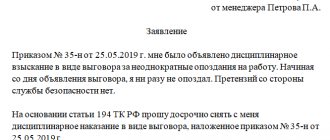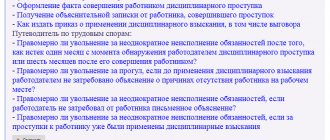What can an employee be punished for?
Employee misconduct is divided into two types - failure to comply with the terms of the employment contract and internal regulations at the enterprise.
According to the contract, a person is accepted to perform certain duties efficiently. During employment, the parties agreed on this and signed an agreement. The personnel officer introduced the newcomer to his job description and internal regulations (IRR) at the enterprise, which clearly described the requirements for compliance with safety regulations, the need for timely completion of management tasks, work and rest hours, the inadmissibility of rude expressions, as well as responsibility for violating all of this.
Here we will also add the provision on keeping trade secrets, technical instructions and other internal regulations that the staff must adhere to.
After reading the documents, the employee signed the introductory sheet and is responsible from that day on. Now if he, for example, is late, he will receive a “discipline” and will not be able to say that he did not know the rules.
Responsibility of employers for violations in the procedure for applying disciplinary sanctions
Based on an employee’s statement about the unlawful imposition of disciplinary punishment, state labor inspectorates have the right to verify the validity of such a decision. If violations are detected on the part of the employer, the order will be declared illegal, and the management of the organization or the company itself as a legal entity will be held administratively liable under Art. 5.27 of the Administrative Code with the imposition of a significant fine (for legal entities it ranges from 30,000 to 50,000 rubles). In case of illegal dismissal, the employee can be reinstated at his own request; in addition, the employer will be required to pay legal costs, moral damages, and earnings for the period of forced absence. At the same time, the validity of imposing a disciplinary penalty can only be checked by a court, but not by the labor inspectorate - this is beyond the scope of its powers. This is the opinion of the Supreme Court of the Russian Federation. In addition, we must not forget that illegal dismissal of pre-retirees now threatens criminal prosecution.
How to punish an employee
The types of disciplinary sanctions are clearly described in Art. 192 Labor Code of the Russian Federation. If an employee, through his own fault, has not fulfilled the obligations assigned by the contract, then the following can be applied to him:
- comment;
- rebuke;
- dismissal.
One violation = one punishment.
In general, you can only choose from these three options. The rest, invented by the employer, are illegal. In practice, they cut wages or issue a severe reprimand. There are no such forms in the Labor Code of the Russian Federation, which means they cannot be used.
At the same time, special legislative acts may provide for other types of penalties, for example: a severe reprimand for military personnel, transfer to a lower position or dismissal in connection with a bribe - in internal affairs bodies.
To choose the appropriate punishment, the severity of the offense and the circumstances in which it was committed are assessed. You cannot accuse a person unfoundedly; you need evidence. A disciplinary sanction, even in the form of a reprimand, is formalized by order and certified by the signature of the director. In this case, you need to meet the following deadlines:
- 30 days from the date of discovery of the misconduct (when the immediate superior became aware of it). Disability and vacations are not included here - if the violator is sick, the terms will be extended.
- No later than 6 months. from the date of commission of the offense, and for an audit or inspection - 2 years. This does not include the time of criminal proceedings.
The company decides whether to include the punishment in the employee’s personal file or not. But it is not recorded in the work book (Article 66 of the Labor Code of the Russian Federation): rewards for success are included, but penalties are not.
Early withdrawal of disciplinary action
Situations related to the identification of official misconduct are often ambiguous. The imposition of a disciplinary sanction in itself does not characterize a person as a person or an employee. For example, the formal absence of valid reasons does not cancel the fact of professional burnout or stress, against the background of which the violation was committed. In such cases, punishment can only aggravate the situation and demotivate. There are opposite situations, when a single punishment helps to mobilize an employee and improve his work results. In any case, the duration of the disciplinary sanction is one year (Article 194 of the Labor Code of the Russian Federation). However, the employer has the opportunity to take an individual approach and lift the disciplinary sanction ahead of schedule, either on its own initiative or at the request of the employee or his immediate supervisor (Article 194 of the Labor Code of the Russian Federation). After the expiration of a year from the date of prosecution, it is removed automatically.
Sample order to remove foreclosure
Remark or reprimand
Such measures are used when the negative consequences are minimal, no one was hurt, no damage was caused to the company or property, and the conflict is completely resolved.
Example 1
The seller Elena left the planning meeting. She responded to the manager’s demand to stay late with obscene language. The boss decided to teach the rude woman a lesson and wrote a report to the store director. She brought witnesses to prove it. Elena violated her job description, which stipulates the obligation to attend meetings, as well as internal regulations, which establish a ban on rude behavior. But since there was no serious damage, she received a warning.
When tardiness, rudeness, and forgetfulness become a habit, a reprimand will be more effective. In general, Art. 192 of the Labor Code of the Russian Federation does not indicate when and what to apply, so the employer chooses the measure himself. A reprimand or reprimand is valid only for a year, after which the punishment is automatically lifted, and there is no need to draw up an order about this.
_________________________________________________
Signatures of those present: ________________________________________________
___________________________________________________________________________
The application of a disciplinary measure to a serviceman based on materials about a disciplinary offense was reported ___________________________
___________________________________________________________________________
(military position, military rank, surname, initials of the commander of the military unit,
___________________________________________________________________________,
head of the garrison, head of the military police body) (As amended by Decree of the President of the Russian Federation dated March 25, 2015 No. 161)
who made the decision on ___________________________________________________
(decision made by an authorized person)
___________________________________________________________________________
Serviceman “___” ___________ 20__ at “___” hour “___” min.
sent to ________________________________________________________________
(name of the military unit or place of detention of the detained military personnel)
Comments to the protocol ______________________________________________________________
(content of comments of the detained serviceman
___________________________________________________________________________
or an indication of their absence)
The protocol has been read, this information has been recorded correctly, the rights and obligations, as well as the possibility of appealing against the application of measures to ensure proceedings based on materials about a disciplinary offense in the manner established by the legislation of the Russian Federation and this Charter (Chapter 6), have been explained, a copy of the protocol has been received
___________________________________________________________________________
(signature of the serviceman in respect of whom the protocol was drawn up, or a note indicating refusal to sign)
“___” ____________ 20__ ___________________________________________________________________________
(signature of the person who compiled the protocol)
"___" ____________ 20__
___________________________________________________________________________
(signature of the person who made the decision to apply to the serviceman a measure to ensure proceedings based on materials about a disciplinary offense)
"___" ____________ 20__
| Applications: | 1. | _______________________________________________________ |
| 2. | _______________________________________________________ | |
| 3. | _______________________________________________________ | |
| 4. | _______________________________________________________ |
Appendix No. 7 to the Disciplinary Charter of the Armed Forces of the Russian Federation (to articles 10, 80, 81)
List of gross disciplinary offenses. The procedure for executing disciplinary arrest
(As amended by Decrees of the President of the Russian Federation dated July 29, 2011 No. 1039, dated January 14, 2013 No. 20, dated July 1, 2014 No. 483, dated March 25, 2015 No. 161, dated January 2, 2017 No. 5, dated May 16, 2017 No. 210, dated 05/06/2020 No. 308, from 02/01/2021 No. 63)
1. Gross disciplinary offenses include:
violation of the statutory rules of relations between military personnel;
unauthorized abandonment of a military unit or a place of military service established outside a military unit by military personnel undergoing military service upon conscription (with the exception of officers);
failure to appear on time for service without good reason upon dismissal from a military unit or from a ship to shore, upon appointment, transfer, as well as from a business trip, vacation or medical (military medical) organization; (As amended by Decree of the President of the Russian Federation dated 02/01/2021 No. 63)
the absence of a serviceman performing military service under a contract, or an officer performing military service by conscription, in a military unit or a place of military service established outside a military unit without good reason for more than four hours in a row during the established daily duty time;
evasion of military service duties;
violation of the rules of combat duty (combat service);
violation of border guard rules;
violation of the statutory rules of guard duty;
violation of the statutory rules for performing internal service;
violation of the statutory rules of patrolling in the garrison;
violation of the rules of service for maintaining public order and ensuring public safety;
intentional destruction, damage, damage, illegal expenditure or use of military property;
destruction or damage due to negligence of military property;
violation of the rules for preserving military property entrusted for official use, resulting in its loss or damage through negligence;
violation of the rules for handling weapons, ammunition, radioactive materials, explosives or other substances and objects that pose an increased danger to others, military equipment or rules for the operation of military equipment, which through negligence resulted in harm to human health, destruction, damage or loss of military property or other harmful consequences;
violation of the rules for driving or operating vehicles, which through negligence resulted in harm to human health, damage to military property or other harmful consequences;
performance of military service duties while intoxicated, as well as a serviceman’s refusal to undergo a medical examination for intoxication;
failure by the commander, within his competence, to take the necessary measures to prevent or suppress a disciplinary offense committed by a serviceman subordinate to him, to bring the serviceman to disciplinary liability for committing a disciplinary offense or to eliminate the causes and conditions that contributed to its commission, as well as the concealment by the commander of information about the commission by a subordinate to him in the service of a military man a crime, an administrative offense or a disciplinary offense;
an administrative offense for which a serviceman bears disciplinary liability in accordance with the Code of the Russian Federation on Administrative Offences;
intentional damage or loss due to negligence of an identification document of a military serviceman of the Russian Federation (service identification card of a military serviceman of the bodies specified in paragraph 1 of Article 2 of the Federal Law of March 28, 1998 No. 53-FZ “On Military Duty and Military Service”); (Added by Decree of the President of the Russian Federation dated January 2, 2017 No. 5)
violation of the rules and requirements establishing the procedure for conducting secret paperwork; (Added by Decree of the President of the Russian Federation dated January 2, 2017 No. 5)
violation of the procedure for leaving the Russian Federation; (Added by Decree of the President of the Russian Federation dated January 2, 2017 No. 5)
violation of the requirements of legislative and other regulatory legal acts of the Russian Federation in the field of intelligence, counterintelligence and operational investigative activities, which created conditions for harming the security of the individual, society and the state or the own security of the bodies carrying out such activities; (Added by Decree of the President of the Russian Federation dated January 2, 2017 No. 5)
knowingly illegal bringing of a serviceman to disciplinary or financial liability; (Added by Decree of the President of the Russian Federation dated January 2, 2017 No. 5)
violation by the commander (chief) of the safety requirements of military service, which led to the death or disability, including temporary, of a serviceman and (or) a citizen called up for military training; (Added by Decree of the President of the Russian Federation dated January 2, 2017 No. 5)
violation of the ban on providing to the media or using the Internet information and telecommunications network to distribute or provide: information that allows one to determine the affiliation or purpose of military personnel with the Armed Forces of the Russian Federation, other troops, military formations and bodies; information about other military personnel, citizens discharged from military service, members of their families or their parents, including information that allows other persons to determine the location of these persons during a certain period; information about your activities or the activities of other military personnel and citizens discharged from military service related to the performance of military service duties; information on the activities of military command and control bodies or command and control bodies of other troops, military formations and bodies, on the activities of associations, formations, military units and other organizations that are part of the Armed Forces of the Russian Federation or other troops, military formations and bodies, on the activities of units of these bodies military command or control bodies, military units and organizations, including information on the deployment or redeployment of military command or control bodies, associations, formations, military units, organizations and divisions, not included in the list of information constituting a state secret; (Added by Decree of the President of the Russian Federation dated May 6, 2020 No. 308)
violation of the prohibition to carry, while performing military service duties, electronic products (devices, technical means) for household purposes, in which they can be stored or which allow, using the information and telecommunications network “Internet,” to distribute or provide audio, photo, video materials and geolocation data , in the following cases: participation in hostilities, performance of tasks in conditions of emergency or martial law, armed conflicts, participation in activities to maintain or restore international peace and security or suppress international terrorist activities outside the territory of the Russian Federation; carrying out combat duty, combat service, service in a garrison outfit, performing duties as part of a daily outfit; participation in exercises or ship voyages; staying on the territory of a military unit during official duty hours established by the daily routine or at other times if this is caused by official necessity; undergoing military training; providing assistance to internal affairs bodies and other law enforcement agencies in protecting human and civil rights and freedoms, maintaining law and order and ensuring public safety; participation in the prevention and mitigation of the consequences of natural disasters, accidents and catastrophes. (Added by Decree of the President of the Russian Federation dated May 6, 2020 No. 308)
11. The actions of a serviceman, provided for in paragraphs twenty-seven and twenty-eight of paragraph 1 of this list, do not relate to gross disciplinary offenses in cases where: the distribution or provision of information is carried out by a serviceman in accordance with federal laws; provision of information is carried out in personal data information systems; dissemination or provision of information is the responsibility of a military serviceman and is carried out in the manner established by regulatory legal acts of federal executive authorities or federal government bodies that provide for military service; electronic products (devices, technical means) for household purposes are used by military personnel to perform their duties in the manner established by regulatory legal acts of federal executive authorities or federal state bodies that provide for military service. (Added by Decree of the President of the Russian Federation dated May 6, 2020 No. 308)
2. Disciplinary arrest is carried out in relation to military personnel:
Armed Forces - military police in guardhouses;
other troops, military formations and bodies by the command of military units in charge of military guardhouses, and in the absence of military guardhouses - by the military police.
(Clause as amended by Decree of the President of the Russian Federation dated March 25, 2015 No. 161)
3. Preliminary clarification of the availability of free places in the guardhouse, verification of the documents necessary for registering a serviceman in the guardhouse, and, if necessary, the request for accompanying persons is assigned in relation to those subject to disciplinary arrest:
soldiers, sailors, sergeants and foremen - to the foreman of a company (team);
warrant officers and midshipmen - to military personnel of equal military rank or officers appointed by the commander of a military unit (chief of the garrison);
military personnel of military command and control bodies and military educational organizations - to persons appointed by the relevant commander.
(Clause as amended by Decree of the President of the Russian Federation dated March 25, 2015 No. 161)
4. Before being sent to the guardhouse, all military personnel subject to disciplinary arrest are confiscated according to an inventory of the money and things they have that are not supposed to be in the guardhouse. The list of things that military personnel subject to disciplinary arrest are allowed to have in the guardhouse is determined in Appendix No. 4 to the Charter of the Military Police of the Armed Forces of the Russian Federation. (As amended by Decrees of the President of the Russian Federation dated July 29, 2011 No. 1039; dated March 25, 2015 No. 161)
Orders, medals and bars with ribbons of orders, as well as badges, are handed over by arrested military personnel for storage at the headquarters of the military unit or at the guardhouse of the military commandant's office. (As amended by Decrees of the President of the Russian Federation dated January 14, 2013 No. 20; dated March 25, 2015 No. 161; dated May 16, 2017 No. 210)
When sent to a guardhouse, military personnel subjected to disciplinary arrest must be dressed in clean, serviceable everyday (field) uniform. In addition, they must have two sheets, a pillowcase, a blanket, a towel, handkerchiefs, and personal hygiene products. (As amended by Decree of the President of the Russian Federation dated March 25, 2015 No. 161)
Before being sent to the guardhouse, all those arrested undergo a medical examination, and, if necessary, sanitary treatment (washing in a bathhouse) and disinfection of uniforms, which is noted by the doctor in the medical record book.
5. The procedure for the reception, detention and release of military personnel subject to disciplinary arrest is set out in the Charter of the Military Police of the Armed Forces of the Russian Federation. (As amended by Decree of the President of the Russian Federation dated March 25, 2015 No. 161)
Appendix No. 8 to the Disciplinary Charter of the Armed Forces of the Russian Federation (to Article 81)
Form
Protocol on gross disciplinary offense
(As amended by Decree of the President of the Russian Federation dated March 25, 2015 No. 161)
"__" __________ 20__ city _______________________________________
(place of drawing up the protocol)
I, ________________________________________________________________________
(military position, military rank, last name, first name, patronymic of the person who compiled the protocol)
drew up this protocol in that the serviceman ___________________________________________________________________________
(information about the military personnel: code name of the military unit (organization);
___________________________________________________________________________
military position, military rank, last name, first name, patronymic; year and place of birth;
__________________________________________________________________________
place of residence (registration), marital status; data on the identification document
___________________________________________________________________________
identity (series, number, when and by whom issued); other information about the military personnel,
___________________________________________________________________________
including: whether you were previously brought to disciplinary liability, when and by whom)
Eyewitnesses:
___________________________________________________________________________
(positions, places of military service, military ranks,
___________________________________________________________________________
surnames, first names and patronymics of persons who know the circumstances relevant to
___________________________________________________________________________
correct decision on the issue of recruiting a military personnel)
Circumstances of committing a gross disciplinary offense:
___________________________________________________________________________
(date, time, place and other circumstances of the gross disciplinary offense)
Evidence confirming the existence of an event of gross disciplinary offense and the guilt of the serviceman:
___________________________________________________________________________
(listing of evidence: explanations of the serviceman subject to disciplinary
___________________________________________________________________________
liability, explanations of eyewitnesses, conclusion and explanations of a specialist, documents,
__________________________________________________________________________,
indications of technical means, material evidence, etc.)
___________________________________________________________, that is, he committed
a gross disciplinary offense under Article 285 of the Federal Law “On the Status of Military Personnel.”
To a military man ______________________________________________________________
(military rank, surname and initials)
the rights and obligations provided for by the legislation of the Russian Federation and general military regulations are explained.
Serviceman's signature ___________________________________________________
(or sign refusal note)
Explanations of a serviceman who committed a gross disciplinary offense:_______________________________________________________________________________ ___________________________________________________________________________
___________________________________________________________________________
Mitigating or aggravating circumstances: _________________________ ___________________________________________________________________________
___________________________________________________________________________
Reasons and conditions that contributed to the commission of a gross disciplinary offense: _________________________________________________________________
___________________________________________________________________________ ___________________________________________________________________________
Information on the measures taken to ensure the proceedings on materials about gross disciplinary offense: ___________________________________________________
___________________________________________________________________________ ___________________________________________________________________________
Other information: ____________________________________________________________ ___________________________________________________________________________ ___________________________________________________________________________
Attached to the protocol: _____________________________________________________
(list of documents and things attached to the protocol)
___________________________________________________________________________
Serviceman's signature ___________________________________________________
(or sign refusal note)
Sign it
Dismissal
You can't just fire an employee. The grounds for termination of an employment contract at the request of the employer are clearly listed in Art. 81 Labor Code of the Russian Federation:
- the employee has not passed the certification;
- absenteeism (absent from work for more than 4 hours in a row);
- came drunk, under the influence of drugs or other illegal drugs;
- grossly violated official duties;
- received disciplinary punishment and still did not do the work;
- disclosed commercial (state, official) secrets;
- stole and damaged the property of the organization or colleagues and was sentenced by the court to liability;
- violated labor protection and caused an accident or knowingly created such a threat;
- committed guilty actions related to material values and lost trust;
- did not submit a certificate of income or provided false information (for civil servants under the Law of July 27, 2004 No. 79-FZ “On the State Civil Service...”);
- committed an immoral act (for educational workers);
- made an unreasonable decision that led to damage to the organization’s property (for directors, deputies and chief accountants);
- When applying for a job, he brought false documents.
In addition, when the owner changes, the new owner can appoint his own director, deputy and chief accountant. And when an enterprise is liquidated or its workforce is reduced, the employees are first offered another job. And, if they refused in writing, you can fire them under Art. 74 Labor Code of the Russian Federation.
It is impossible to dismiss an employee on sick leave or on vacation, except in cases of liquidation of the enterprise or termination of activities by an individual entrepreneur.
Punishing an employee: step-by-step instructions
The procedure for applying disciplinary sanctions is set out in Art. 193 Labor Code of the Russian Federation. Let's look at the procedure using a specific example.
Example 2
Lyudmila, a cloakroom attendant at a medical center, left her workplace without warning. As a result, patients were unable to return clothing and were late for appointments. The misconduct was discovered by a senior nurse who received a complaint from citizens. She wrote a report, and now we have to issue a disciplinary punishment.
When is punishment illegal?
The punishment may be considered illegal if:
- the employee’s guilt in a disciplinary offense is absent, is not related to labor functions or has not been proven;
- there is no written confirmation of the fact that the employee timely familiarized himself (on receipt) with local acts establishing the rules of labor discipline and the list of job responsibilities;
- in local acts there is no record of their coordination with a trade union organization or that such an organization has not been created;
- an explanatory note regarding a disciplinary offense was requested from the employee after a penalty was imposed on him;
- the set of documents substantiating the fact of a disciplinary offense is incomplete;
- the decision to collect was made by a person who is not authorized to do so;
- the deadlines for completing documents related to a disciplinary offense or making a decision on punishment were not met.
Let's sum it up
- Disciplinary action is voluntary; the law does not oblige the employer to punish employees. You can warn in words, but it has no legal force.
- If you decide to punish, then you need to choose one of the options established by law - reprimand, reprimand, dismissal. Termination of the contract is possible only for specific offenses described in Art. 81 Labor Code of the Russian Federation.
- The collection is valid for a year and is automatically canceled. If the manager allows it, it can be removed early.
Unlock access to the private part of Clerk with a Premium subscription. Get hundreds of webinars and online courses, unlimited consultations and other proprietary content for accountants.
Hurry up to subscribe with a 20% discount until October 15, 2021. Read more about “Premium” here.











